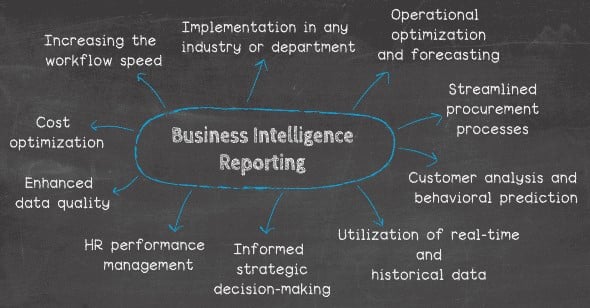In today’s fast-paced business environment, generating business reports is essential to measure performance and make informed decisions. Business Intelligence (BI) tools can be used to gather data from multiple sources, analyze it, and create visually appealing reports. In this article, we will explore how BI tools can help businesses generate comprehensive reports that drive success.
-
What is Business Intelligence?
Business Intelligence refers to the use of technology to gather, analyze, and present data that helps businesses make informed decisions. BI tools can collect data from various sources, such as databases, social media, and websites. Once the data is collected, it is transformed into meaningful insights that can be used to drive business growth. BI tools are used in several areas, including sales, marketing, finance, and operations.
-
Benefits of BI Tools in Generating Reports
BI tools have several benefits when it comes to generating reports for businesses. Here are some of them:
2.1. Saves Time and Effort
Generating reports manually can be time-consuming and prone to errors. With BI tools, businesses can automate the report generation process, saving time and effort. Reports can be generated in real-time, ensuring that businesses always have up-to-date data.
2.2. Increases Accuracy
BI tools use algorithms and advanced analytics to process large amounts of data accurately. This reduces the risk of human errors and ensures that businesses have accurate data to base their decisions on.
2.3. Customizable Reports
BI tools allow businesses to customize reports based on their specific needs. Reports can be generated based on parameters such as date range, region, and product. Customizable reports provide businesses with the flexibility to analyze data in a way that is meaningful to them.
2.4. Visual Representation of Data
BI tools provide businesses with visually appealing reports that are easy to understand. Reports can be created using charts, graphs, and tables, making it easier for businesses to identify trends and patterns in the data.
-
BI Tools for Generating Reports
There are several BI tools available in the market that businesses can use to generate reports. Here are some of the most popular ones:
3.1. Tableau
Tableau is a powerful BI tool that allows businesses to create visually appealing reports. It is user-friendly and can be used by anyone, regardless of their technical skills. Tableau can connect to various data sources, including Excel, SQL Server, and cloud-based platforms.
3.2. Power BI
Power BI is a cloud-based BI tool that provides businesses with real-time insights. It can be integrated with other Microsoft products, such as Excel and SharePoint. Power BI allows businesses to collaborate and share reports with other team members.
3.3. QlikView
QlikView is a BI tool that provides businesses with interactive reports. It allows users to analyze data from multiple sources and create customized dashboards. QlikView is suitable for businesses of all sizes, from small startups to large corporations.
-
Best Practices for Generating Business Reports
To generate effective business reports using BI tools, businesses need to follow certain best practices. Here are some of them:
4.1. Define Clear Objectives
Before generating reports, businesses need to define clear objectives. They need to identify what they want to achieve from the report and what data they need to gather to achieve it.
4.2. Use Relevant Data
BI tools can gather data from various sources. However, businesses need to use relevant data that is related to their objectives. Using irrelevant data can lead to inaccurate insights and poor decision-making.
4.3. Keep Reports Simple and Easy to Understand
Reports should be simple and easy to understand. They should be visually appealing and use simple language. This ensures that everyone in the business can understand the report and make informed decisions based on it.
4.4. Ensure Data Accuracy
Data accuracy is critical in generating reports. Businesses need to ensure that the data they use is accurate and up-to-date. They should also verify the data before generating reports to avoid errors.
4.5. Regularly Review and Update Reports
Reports should be reviewed regularly to ensure they are still relevant and useful. Businesses should update the reports based on changes in the business environment and objectives.
-
Conclusion
In conclusion, BI tools are essential in generating comprehensive reports for businesses. They save time and effort, increase accuracy, provide customizable reports, and offer visual representation of data. Popular BI tools, such as Tableau, Power BI, and QlikView, provide businesses with real-time insights and the ability to collaborate and share reports. To generate effective reports, businesses need to define clear objectives, use relevant data, keep reports simple and easy to understand, ensure data accuracy, and regularly review and update reports.
By following best practices and utilizing BI tools, businesses can generate reports that drive success and help them make informed decisions. As the business environment becomes increasingly competitive, generating effective reports using BI tools is critical to stay ahead of the competition.
Read More :
- Business Intelligence Best Practices : From Data Governance to Visualization
- The Benefits of Cloud-Based Business Intelligence Tools for Remote Work
- Revolutionizing Your Reporting Process with Business Intelligence Tools
- Business Intelligence : A Strategic Tool for Organizational Success
- Maximizing Profits with Business Intelligence Analytics
